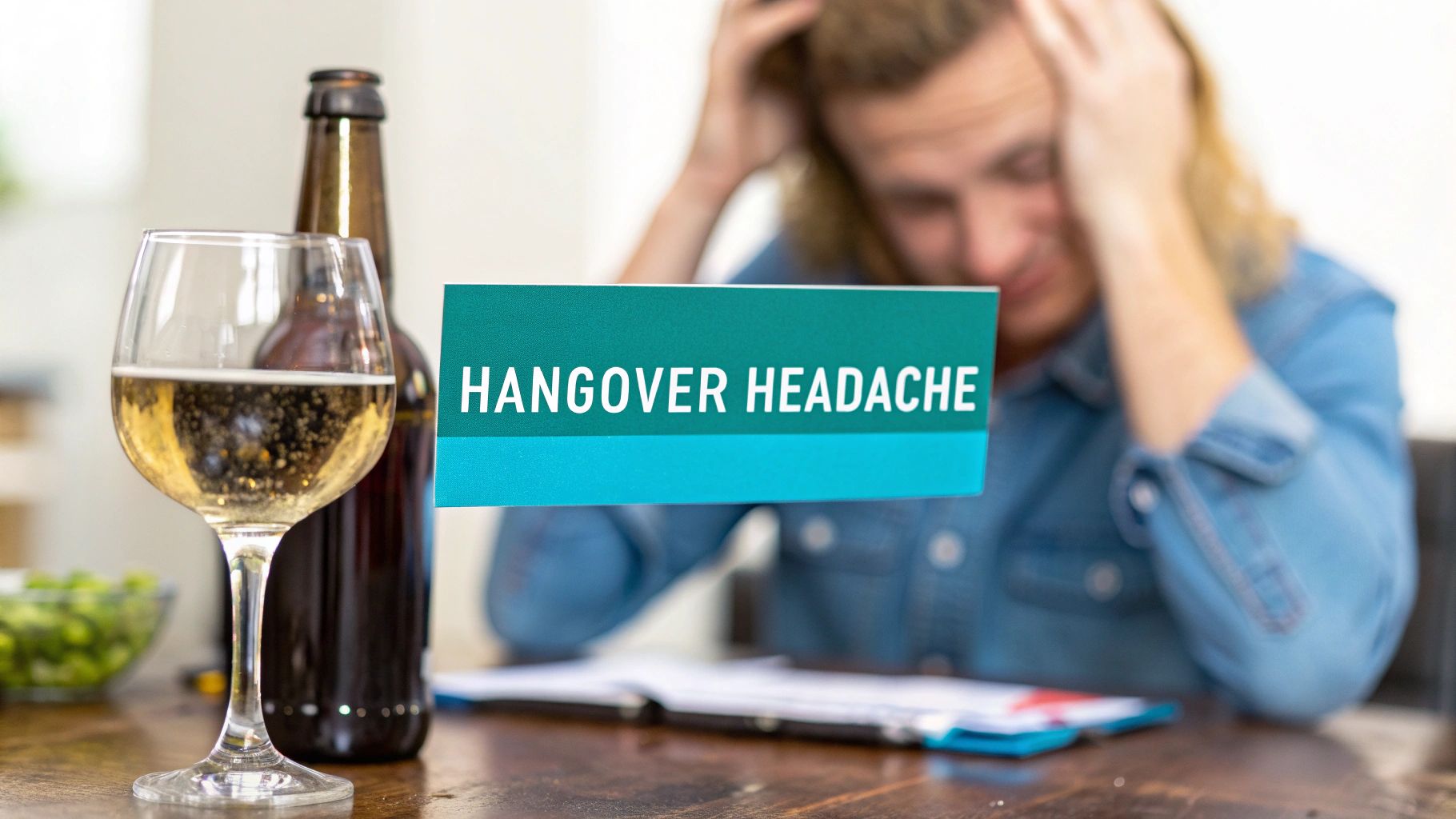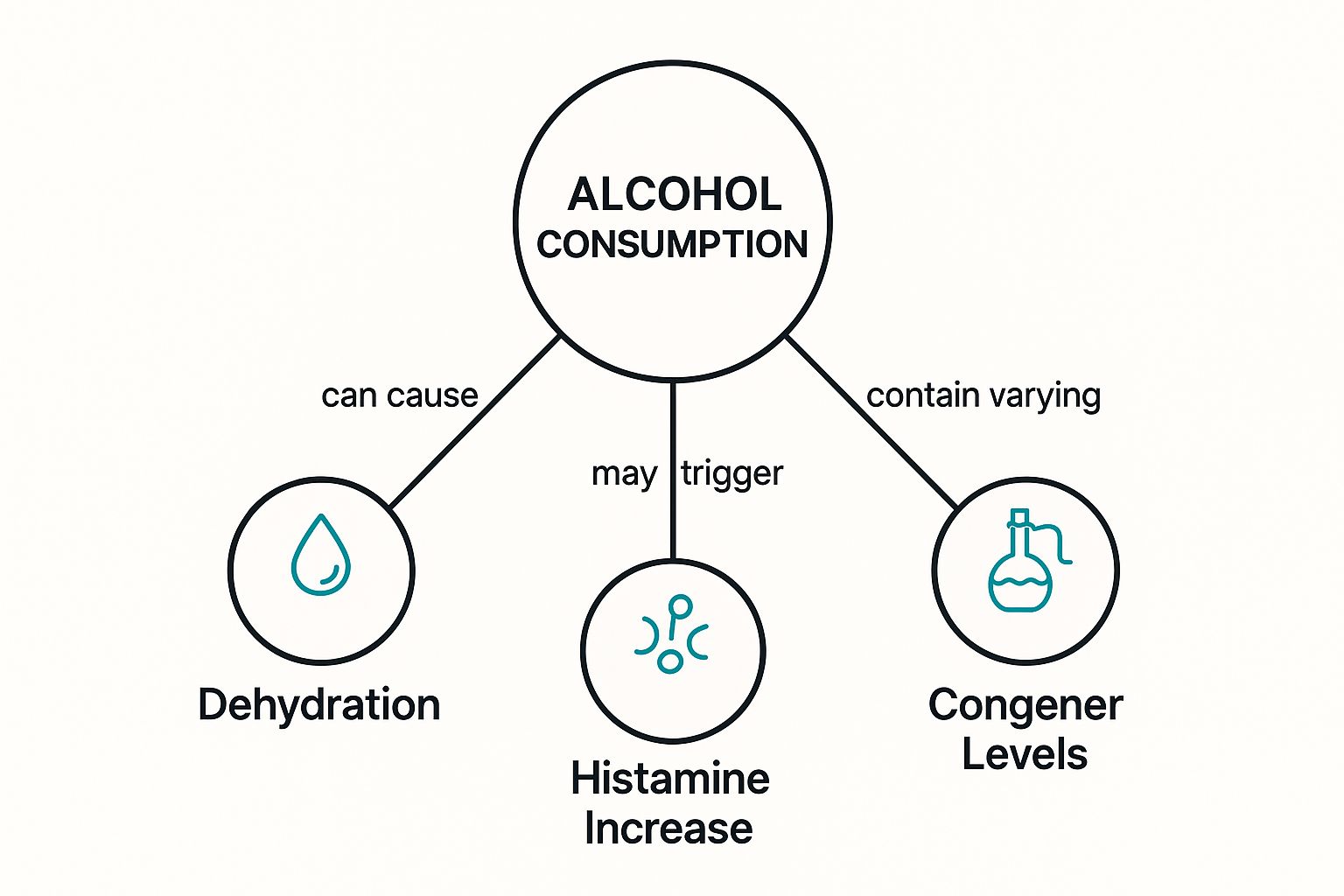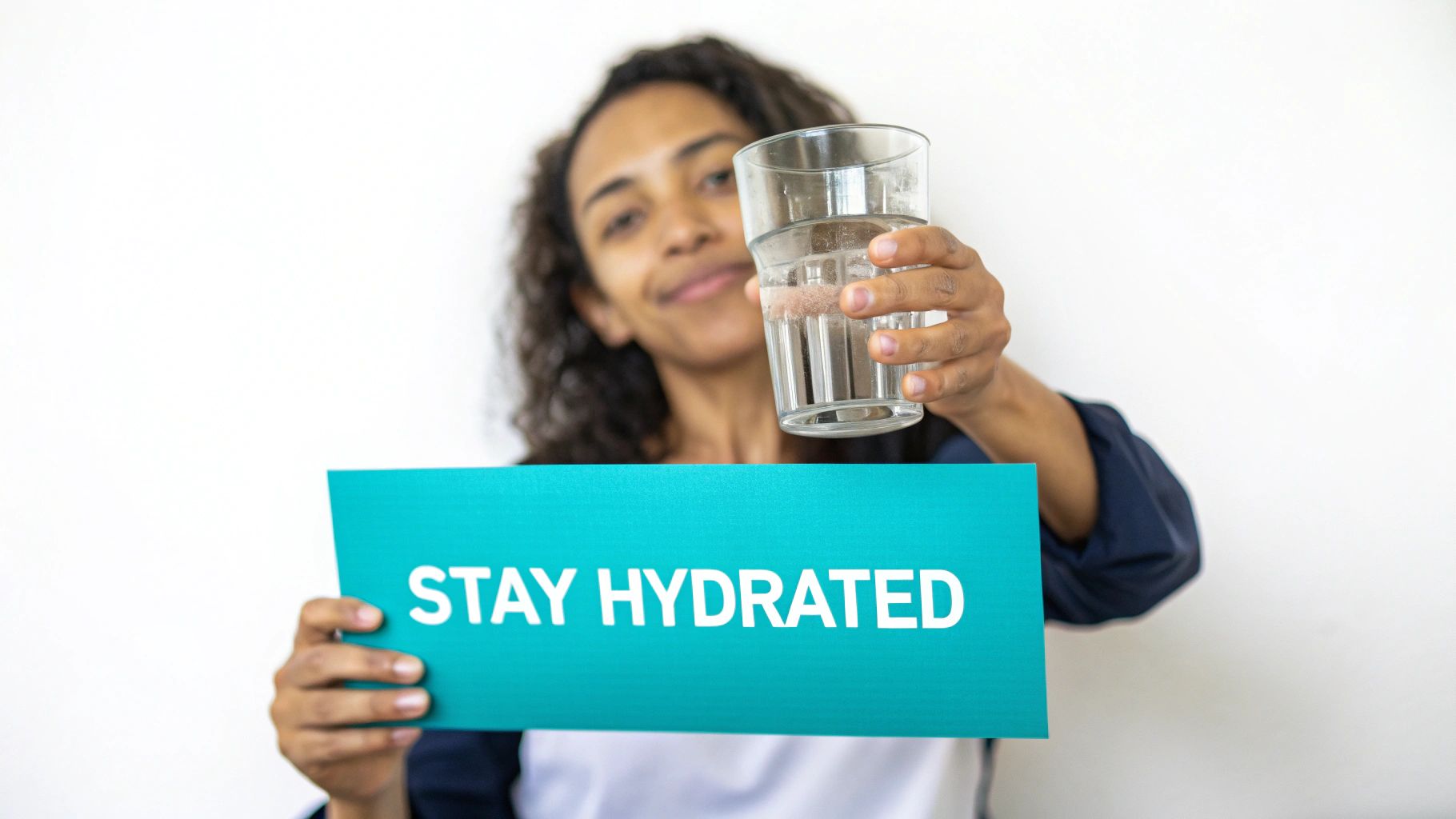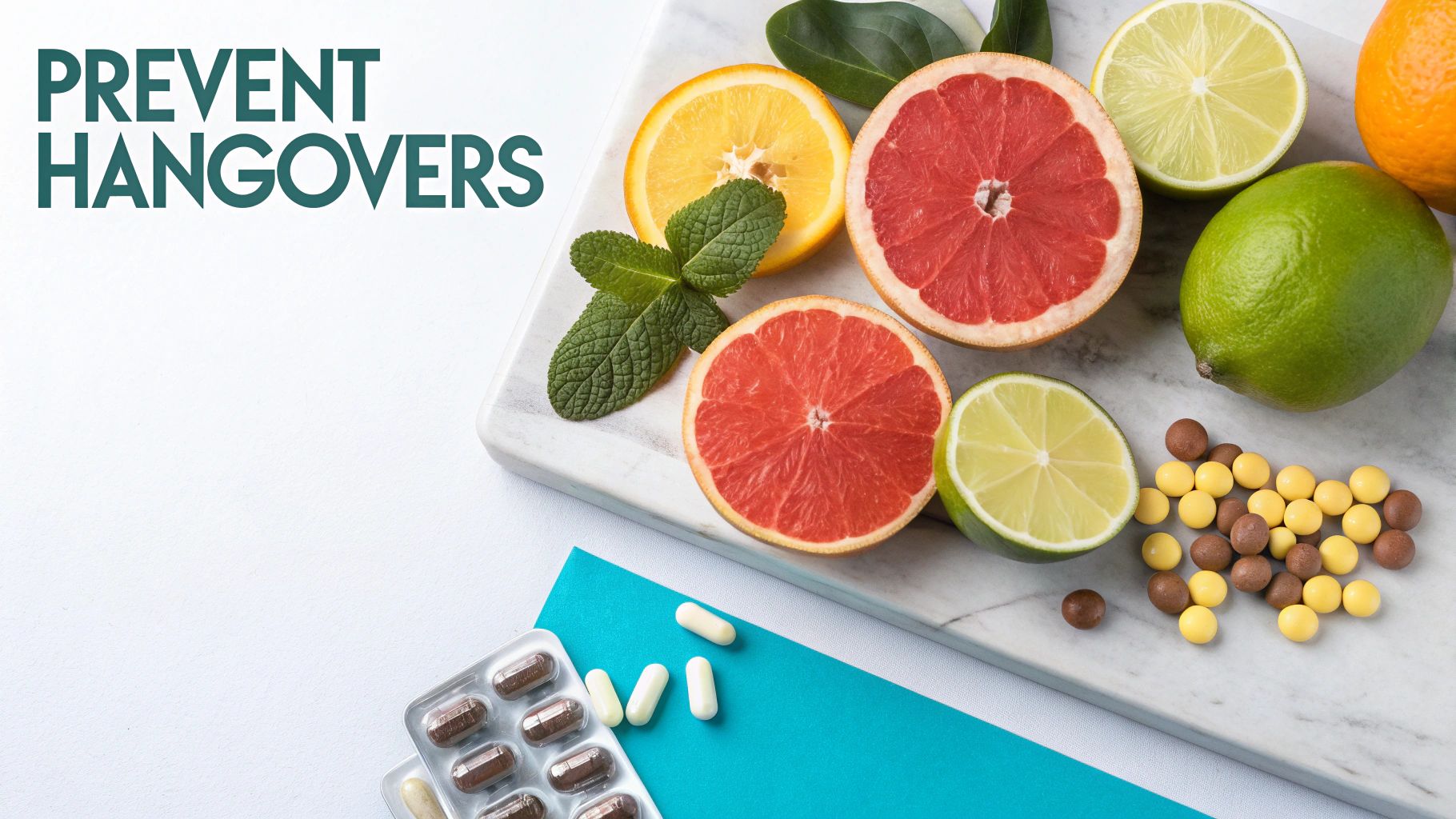

· By Annemarie
Why Do I Get Headaches After Drinking Alcohol? Here's Why & Fixes
That throbbing pain you feel after a few drinks isn't just bad luck. It's a direct, predictable reaction from your body telling you something's up. Headaches from alcohol boil down to a perfect storm of dehydration, inflammation, expanded blood vessels, and totally disrupted sleep. Any one of these is enough to cause some discomfort, but together, they create that all-too-familiar pounding in your head.
The Four Main Reasons Alcohol Causes Headaches
When a headache hits after drinking, it’s not just one thing going wrong. Think of it as a domino effect. Your body is working overtime to process something it sees as a toxin, and the headache is basically a distress signal from all that effort.
It's a four-part problem brewing inside your system, and each part makes the others even worse.

This visual breaks down how a single action—drinking—can set off multiple different reactions in your body. Things like dehydration and inflammation might seem separate, but they all lead to the same painful result. Getting to know these individual culprits is the first real step to avoiding them.
So, let's pull back the curtain on exactly what's happening inside your head.
Unpacking the Triggers
An alcohol-induced headache isn't a mystery. We can trace it back to four key things your body does in response to alcohol. They often team up to make you feel much worse than any single one would on its own.
To make it simple, here's a quick rundown of the main offenders.
| How Alcohol Triggers a Headache | |
|---|---|
| Mechanism | How It Leads to a Headache |
| Dehydration | Alcohol makes you pee. A lot. This fluid loss can actually cause your brain to shrink slightly, pulling on the membranes that connect it to your skull. Ouch. |
| Inflammation | Your immune system can see alcohol as a threat and launch an inflammatory response. This creates that general feeling of sickness and contributes to head pain. |
| Vasodilation | Alcohol causes your blood vessels to relax and widen. In your head, this expansion can be a major trigger for migraines and other intense headaches for some people. |
| Sleep Disruption | A drink might make you feel sleepy at first, but it wrecks your sleep quality later in the night. Poor, fragmented sleep is a classic headache trigger. |
Each of these reactions is a piece of the puzzle. When you combine them—a shrunken brain from dehydration, an inflammatory response, widened blood vessels, and a night of terrible sleep—it's no wonder your head feels like it’s in a vice grip the next morning.
Dehydration: The Mastermind Behind Your Pain

While a few different things conspire to create that pounding in your head, dehydration is almost always the ringleader. Alcohol is a diuretic, which is just a fancy way of saying it makes you pee—a lot. It pulls this off by blocking a hormone called vasopressin, which is in charge of telling your kidneys to hang onto water.
Without that crucial signal, your kidneys just open the floodgates. They start flushing out water and vital electrolytes way faster than you can put them back. In fact, for every standard alcoholic drink, your body can push out up to four times as much liquid. That imbalance is where the real trouble begins.
The Brain-Shrinking Effect
So what does losing all that fluid have to do with your head? A whole lot, it turns out. Your brain is about 75% water and is incredibly sensitive to even minor shifts in your body's hydration.
When you start to get dehydrated, your brain tissue literally loses water and shrinks. This slight contraction causes your brain to pull away from the inside of your skull, which stretches the delicate membranes connecting them (called the meninges). That physical tension is a direct cause of the pain you're feeling.
A good way to picture it is to think of your brain as a sponge floating inside a jar of water. Normally, it’s plump and fits just right. But when you drink, it’s like someone starts draining the jar. The sponge shrinks and tugs on the little strings holding it in place—and that tugging is your headache.
Really getting a handle on how alcohol dehydrates you is the first step to stopping the pain before it even gets a chance to start. It’s more than just losing water; it's a hormonal trick that leaves your body scrambling to keep up.
How to Spot a Dehydration Headache
A headache that’s rooted in dehydration has a few tell-tale signs. If you can recognize them, you can tackle the problem head-on.
Here’s what to look out for:
- A dull, throbbing pain: The ache usually feels like it’s all over your head, not just on one side.
- Pain gets worse with movement: Bending over, walking quickly, or even just a sharp turn of your head can make the pounding more intense.
- Other symptoms tag along: You’ll probably also feel thirsty, have a dry or sticky mouth, feel a bit dizzy, and be hit with a wave of fatigue.
These signs are your body's not-so-subtle way of screaming for water. Responding quickly is your best defense. That's why the old advice to drink a glass of water between every alcoholic beverage isn't just a myth—it's one of the smartest moves you can make on a night out.
How Your Liver Creates Headache-Inducing Toxins

While dehydration is a big part of the story, there’s another, more complex process unfolding inside your liver that leads directly to that throbbing head. When you drink, your liver kicks into high gear, treating alcohol (ethanol) as a poison that needs to be broken down and flushed out ASAP.
To get the job done, it uses a two-step metabolic process. You can think of your liver as a chemical processing plant with a very specific assembly line. Its main goal is to convert that ethanol into harmless stuff your body can easily get rid of.
But, like any factory, this system can get overloaded. And it's during a crucial middle step in that assembly line that the real headache-causing villain is born.
The Toxic Middleman: Acetaldehyde
As your liver starts breaking down ethanol, the very first thing it creates is a compound called acetaldehyde. This stuff is seriously nasty—in fact, some studies show it’s up to 30 times more toxic than alcohol itself. Normally, your liver is a champ and quickly turns acetaldehyde into a harmless substance called acetate (which is basically vinegar).
The problem starts when you drink faster than your liver can keep up. That internal assembly line gets backed up, and toxic acetaldehyde starts to pile up in your system. Because it’s so poisonous, it triggers widespread inflammation all over your body, including in and around your brain.
This massive inflammatory response is a key reason you get a headache after drinking. Your body is essentially reacting to being poisoned, and the headache is a direct signal of that internal chaos. The more acetaldehyde builds up, the worse the inflammation gets, and the more your head pounds.
Think of a factory getting a surprise shipment of way too much raw material. The workers can't keep up, and a toxic chemical starts leaking all over the factory floor, gumming up the works for everyone. That toxic spill is acetaldehyde building up in your liver.
This whole bottleneck situation is exactly why pacing yourself is so critical. If you give your liver enough time to do its job and clear out the acetaldehyde, you can sidestep the inflammatory reaction that leads to a killer headache. To get a closer look at the science, you can learn more about how alcohol metabolism affects your body.
Your Genes Play a Role
Ever wondered why one friend can have three drinks and feel fine, while you’re hurting after just one? A big piece of that puzzle is written in your DNA.
Your body produces an enzyme called aldehyde dehydrogenase (ALDH2), which is the cleanup crew responsible for neutralizing toxic acetaldehyde. But thanks to genetic quirks, the efficiency of this enzyme can be wildly different from person to person.
- Efficient ALDH2: Some people are lucky enough to have a super-active version of this enzyme. Their bodies clear out acetaldehyde quickly, so they’re way less likely to deal with a bad hangover.
- Less Efficient ALDH2: Others have a sluggish or even deficient version of the enzyme. For them, acetaldehyde hangs around in the body much longer, causing more severe and prolonged inflammation. This is what leads to those intense headaches, facial flushing, and nausea.
This genetic lottery is especially common in people of East Asian descent, but it can really affect anyone. It’s a perfect explanation for why some of us feel the painful effects of alcohol almost immediately. It’s not about having a "low tolerance"—it's about the unique biochemical toolkit your body was born with.
Why Certain Drinks Hit You Harder Than Others
Ever wonder why a night of bourbon can leave you with a sledgehammer headache, while a few vodka sodas barely make a dent? It’s not just in your head. The drink you choose has a massive impact on how you feel the next day, and it all comes down to something called congeners.
Congeners are chemical extras created during the fermentation and aging process of alcohol. They’re what give darker spirits their signature flavors, smells, and colors. While they make your drink more interesting, they also make your hangover a whole lot worse.
The Congener Connection to Your Headache
Think of congeners as little impurities. When your body gets to work breaking down alcohol, it also has to deal with these complex compounds. This puts extra stress on your system, kicking the inflammatory response that causes a pounding head into overdrive.
It's a pretty straightforward rule: the darker the drink, the more congeners it has, and the bigger the risk of a nasty headache. Clear spirits like vodka and gin go through heavy filtration, which strips out most of these troublemaking compounds.
The link between alcohol and headaches gets especially tricky for people who get migraines. While alcohol is a known trigger for about 27% of migraine sufferers, it's not always a clear-cut case. Interestingly, some research suggests there isn't a definitive link between wine and an increased migraine risk, but everyone's sensitivity is different. You can read more about the connection between wine and migraine headaches if you're curious.
Simply being a bit more mindful about what you're drinking can be a game-changer. If you want to dive deeper, check out our guide on what alcohol causes the least hangover for even more tips.
Congener Levels in Popular Alcoholic Drinks
To really see how this plays out, it helps to compare different drinks. Choosing wisely before you start your night is one of the best ways to protect yourself from a morning of regret.
This table breaks down common drinks by their congener levels, so you know what you're getting into.
| Drink Type | Congener Level | Potential for Headache |
|---|---|---|
| Vodka | Very Low | Low |
| Gin | Very Low | Low |
| White Rum | Low | Low |
| White Wine | Medium | Moderate |
| Beer | Medium | Moderate |
| Tequila | Medium | Moderate |
| Red Wine | High | High |
| Whiskey | Very High | Very High |
| Bourbon | Very High | Very High |
| Brandy | Highest | Very High |
As you can see, sticking to clear liquors can give your body a much-needed break and a better chance at a smooth morning.
Ranking Drinks by Congener Levels
To make it even simpler, here’s a quick rundown from the safest bets to the biggest headache-inducers.
- Low Congeners: Vodka, Gin, White Rum
- Medium Congeners: White Wine, Beer, Tequila
- High Congeners: Red Wine, Whiskey, Bourbon, Brandy
Picking drinks from the low-congener list can seriously reduce your odds of a brutal headache. You’re giving your body less junk to process, which is always a good thing.
Practical Ways to Prevent and Relieve Alcohol Headaches

Knowing why you get a headache after drinking is one thing, but actually doing something about it is what counts. It's always better to get ahead of the problem than to deal with the aftermath. With a few smart moves before and during your night out, you can seriously lower your chances of waking up in a world of hurt.
Strategies for Headache Prevention
The best way to handle an alcohol-induced headache? Stop it from ever starting. This doesn't mean you have to be a wallflower; it just takes a little forethought.
Think of it like getting ready for a big run. You wouldn't just jump into a marathon without hydrating and fueling up first, right? The same logic applies here. A few simple steps can make all the difference.
- Hydrate Before You Go: Guzzle water all day long before you plan on drinking. Showing up already hydrated gives your body a fighting chance against alcohol’s dehydrating effects.
- Eat a Real Meal: Seriously, never drink on an empty stomach. A good meal with protein, healthy fats, and complex carbs slows down how fast alcohol hits your bloodstream. This gives your liver a little more time to do its job.
- Pace Yourself: The golden rule is about one standard drink per hour. This lets your body metabolize the alcohol and its nasty byproducts without getting totally overwhelmed.
- Stick to Lighter Drinks: Like we talked about, darker drinks are loaded with those headache-causing congeners. Swapping your bourbon for vodka or gin can make a surprisingly big difference in how you feel the next day.
Finding Relief When a Headache Strikes Anyway
Look, sometimes a headache just happens, no matter how careful you are. When it does, your mission is simple: put back what your body lost. The game plan is to rehydrate, restock on nutrients, and manage the pain without making things worse.
Your absolute number one priority is rehydration. But it’s not just about chugging plain water. You’ve lost electrolytes, too—those are the essential minerals that keep your body’s fluids and nerve signals in balance.
An electrolyte drink, a cup of broth, or even a banana can help get your body back to equilibrium way faster than water alone.
Alcohol is a major, and totally avoidable, trigger for headaches. These aren't just a minor annoyance; headache disorders are one of the most common neurological conditions on the planet, affecting about 40% of the global population—that's 3.1 billion people. Research shows that having five or more drinks bumps your risk of a headache the next day by over 65%. You can dig into the global headache disorder statistics from the WHO to learn more.
Smart Choices for Pain Relief and Recovery
When you're reaching for an over-the-counter painkiller, you have to be smart about it. Your liver is already working overtime processing last night’s fun, and some meds can add a dangerous amount of stress.
What to Use (and What to Avoid):
- Safer Choice (NSAIDs): Go for non-steroidal anti-inflammatory drugs like ibuprofen (Advil) or aspirin. They work by taming the inflammation that’s contributing to your pounding head. Just be sure to take them with a little food, as they can be a bit rough on an empty stomach.
- Avoid This One (Acetaminophen): Stay far away from acetaminophen (Tylenol). When there's alcohol in your system, your liver processes this drug in a way that creates toxic byproducts, which can lead to serious liver damage. Mixing the two is a genuinely bad idea.
Finally, be kind to your stomach and focus on gentle, nutrient-packed foods. Think easy-to-digest stuff that’s full of vitamins, like toast with avocado, some eggs, or a fruit smoothie. These give your body the fuel it needs to recover without causing any more trouble.
When Your Headache Might Be Something More Serious
Most of the time, a headache after a few drinks is just a classic hangover—your body’s way of complaining about dehydration and inflammation. It's usually nothing a big glass of water and some rest can't fix.
But every now and then, that pounding in your head can be a red flag for something more serious that alcohol just happened to trigger, like a migraine or a cluster headache. Knowing how to tell the difference is a game-changer for your health.
A standard hangover headache is a dull, throbbing pain that you can feel on both sides of your head. It usually brings along its unwelcome friends: fatigue, nausea, and a sudden hatred for bright lights. If your headache feels way more intense or just different than usual, it's time to listen to your body.
Differentiating Headache Types
Let's get one thing straight: not all brutal headaches are created equal. For some people, alcohol is a powerful trigger for underlying headache disorders, and each one has its own distinct personality.
Figuring out which one you’re dealing with can help you understand if it’s more than just a hangover.
-
Migraine Headaches: Think of these as a one-sided attack. Migraines often bring an intense, pulsating pain, usually on just one side of the head. They’re also notorious for causing nausea, vomiting, and an extreme sensitivity to light and sound. Some people even get a weird visual "aura" before the pain kicks in.
-
Cluster Headaches: These are thankfully less common, but they are incredibly painful. The pain is often described as a sharp, burning, or piercing sensation right in or around one eye, or on one side of your face. They can hit you out of nowhere and might come with a stuffy nose, a droopy eyelid, or tearing on the same side as the pain.
The link between booze and headaches is no secret, and it’s been studied pretty extensively. Research confirms that alcohol can definitely trigger these kinds of primary headaches, but who it affects and how varies a lot based on age, sex, and even where you live. If you want to dive into the stats, you can explore the detailed data on alcohol's role in headache disorders to see the patterns for yourself.
Red Flags That Signal a Doctor Visit
While most post-drinking headaches will fade away with some TLC, there are a few symptoms you should absolutely never ignore. If your headache shows up with any of the following, it’s time to get medical help right away:
- A sudden, blindingly severe "thunderclap" headache that comes on in an instant
- A stiff neck paired with a high fever
- Feeling confused, losing your memory, or having trouble speaking
- Numbness or weakness on one side of your body
- Changes in your vision or a sudden loss of balance
These could be signs of a serious neurological issue. When it comes to your health, it’s always better to be safe than sorry and get a professional opinion.
Got Questions About Alcohol Headaches? We've Got Answers.
Let's tackle some of the most common questions about that dreaded post-drinking headache. Here are some clear, no-nonsense answers to help you figure out your body’s unique reaction to alcohol.
Why Do I Get a Headache After Just One Drink?
If a single drink is enough to kick off a headache, you're probably just highly sensitive to alcohol's effects. It's more common than you'd think, and a few things could be going on.
Genetics can be a huge factor here. Some of us have a less efficient version of an enzyme called ALDH2. This means the toxic compound acetaldehyde—a nasty byproduct of alcohol breakdown—builds up in your system way faster, triggering inflammation and pain almost immediately. Another common culprit? If you're already prone to migraines, alcohol is a well-known trigger that can set one off.
Do Hangover Cures or Supplements Actually Work?
The market is absolutely flooded with products promising to wipe away a hangover, but honestly, their effectiveness is all over the map. Most of the popular "cures" are just a cocktail of vitamins, electrolytes, and maybe some caffeine.
While they can definitely make you feel a bit more human by tackling dehydration and fatigue, they don't magically erase the toxins your liver is still working overtime to process. They're more of a band-aid than a true remedy.
Look, the best "cure" is always going to be prevention. No supplement can completely undo the cellular stress and inflammation from drinking too much. Your best bet is always to focus on staying hydrated and drinking in moderation from the start.
